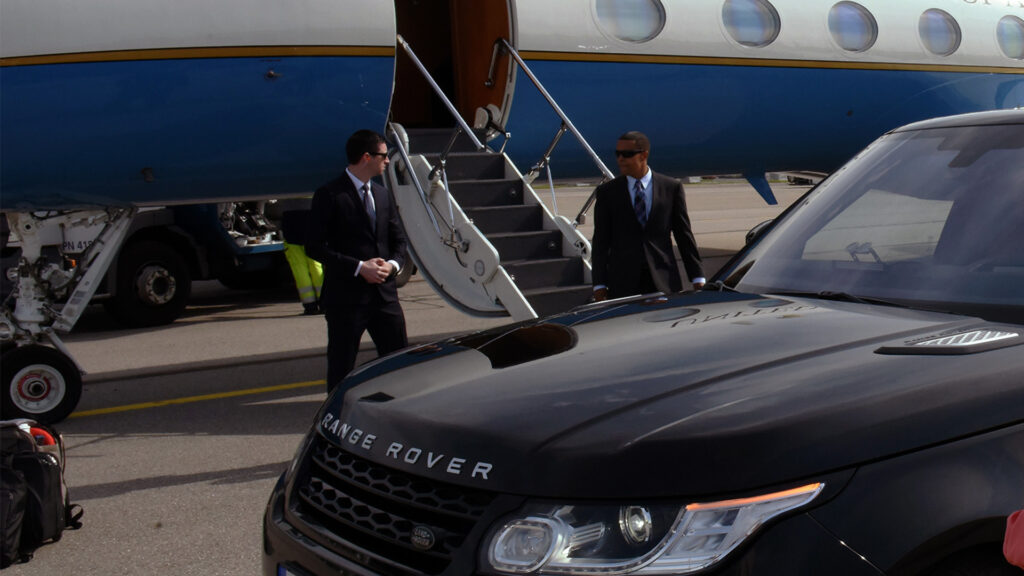Whether traveling domestically or abroad, the safety and security of executives come down to the employment of a well-trained executive security team. A unit that knows the lay of the land is an immeasurable asset for providing a client with a safe and secure experience. When government officials, celebrities, and CEOs hire private security for travel, they do so to eliminate stress and better concentrate on their job. However, many high-ranking individuals are unaware of the dangers lurking at embus/debus points and in volatile settings.
But, should a crisis arise, a well-trained team equipped with the necessary skills and armaments can safely remove the protectee from the dangerous situation.
Naturally, no one wishes to encounter a potentially harmful situation. Nonetheless, this is the reality of touring or conducting business globally. And most attacks are preventable – with the help and expertise of a trusted executive protection team.
International Travel and Security Risk
Many of the risks that travelers face seem constant. Yet, rising tensions globally and the ongoing COVID-19 uncertainty have exacerbated certain risks around security and safety during traveling.

In contrast, pandemic restrictions have eased, and most global borders are starting to open. Hence, the travel industry is slowly returning to normal pre-COVID-19 levels. Still, the travel landscape in 2022 is more unstable than ever. And it isn’t looking to quiet down anytime soon. Not to mention, the much-reduced aviation industry struggles to cope with unprecedented demands.
Further, the shift in events may affect destinations for travelers and ex-pat assignments. Some of the culprits for this include:
- Civil unrest
- Lack of access to healthcare
- Personal safety concerns
- Natural disasters
Specific regulations are still in place regarding COVID prevention measures depending on the country you’re visiting. For instance, different states in the U.S. enacted wildly different policies subject to specific needs.
There are ever-changing rules on testing, vaccines, and quarantines to comply with when traveling. That depends on the state or national government. As of 17 April 2022, Australia requires international arrivals to be fully vaccinated.
For this reason, travel experts recommend checking both country and state requirements for the most accurate information.
Navigating a complex risk landscape for high-net-worth individuals and other public figures is no easy feat. The reason is that restrictions can change rapidly and may delay an executive’s safe return home.
Hire Private Security for Travel Anywhere
It’s possible to hire private security for travel in almost any country. Nevertheless, finding legitimate close protection professionals may be difficult. A better solution is to engage someone specializing in foreign travel advisory or a competent person with many security contacts. That includes vetted security companies with a clean track record in providing full-service international executive protection and threat management.
Remember, some countries may now be less equipped to handle events when a crisis hits because of scarce emergency resources or exhaustible infrastructure. Therefore, it’s advisable to seek a professional security consultant who is well established in that country and can assist in finding the right kind of information.
Or better yet, the principal may travel with a contracted security team, if feasible. The security team knows the clients’ needs “like the back of their hand,” having conducted multiple intelligence and threat assessments.
On the other hand, there may be specific travel guidelines to follow. For example, if agents are to be armed, how will they transport firearms, and what are the local licenses required to carry weapons? Note that some countries prohibit CPOs to carry guns under their jurisdictions. To not provoke conflict with local law enforcement officers, it’s best to collect this information beforehand.
At this year’s Invictus Games in The Hague, Prince Harry and Meghan Markle are seen flanked by five bodyguards as they warmly embraced competitors. Harry and Meghan’s status as VVIPs (very very important people) has them protected by local police and the Dutch royal protection unit.
It’s All About Intel and Prevention
When you hire private security for travel, the team usually includes:
- Security specialists,
- Guides,
- Drivers,
- Armored vehicles with bulletproof glass, and much more.
Everyone a part of the team is there to help secure a client’s time abroad as safe and convenient.
Having armed bodyguards while vacationing is all about intel and prevention. The team better prepares for potential risks by employing a travel advance before the trip starts. In some cases, the team is already in the country doing the advance personally. Other times, they handle desk research from afar.
As part of the advance, the agents thoroughly research each location and travel route on the exec’s itinerary. They may utilize a wide selection of open source and contracting tools to identify potential vulnerabilities and develop a plan to mitigate risks. Along with backup options if necessary.
Secondly, critical incident reporting is information an agent wants to collect as soon as possible. Particulars like: Is there any news about the current or next venue?
Let’s say the principal just heard there’s a riot outside a hotel, the next stop for a business meeting. When they turn to you — the agent — it’s vital to know what the trouble’s all about. For instance, is the side entrance to the adjacent hotel safe?
Individual officers and teams can now easily track travelers and communicate with them in real-time. Technology helps you get immediate access to risk information and emergency and crisis alerts when needed.
Some companies collaborate with a security operations center (SOC) to look for anomalous activity that may indicate a security incident. Such as in the case of a medical crisis, the use of contracted resources like Penn Passport or International SOS allows the team to obtain immediate medical advice.
Full-Proof Measures to Use When Traveling
Executive protection work is executive protection work — no matter where in the world they are. Most close protection agents spend a large chunk of their time traveling domestically and abroad.
Thus, taking a trip across borders presents a unique level of planning and coordination. So, here are some helpful tips to be considered for agents and those looking to hire private security for travel.
#1 A Solid Security Advance: The adage that planning is everything highlights the necessary, but sometimes overlooked step in the overall security plan. Conducting an advance that includes route and accommodation planning is a must. Hence, you eliminate the element of surprise and possible complacency on the part of the security team.
#2 Head Travel Warnings: Some countries are dangerous to visit, requiring frequent information and intelligence gathering before and during the trip. The agent’s job is to assess the risks, advise the client of the risks, and plan to mitigate or avoid this as best as possible.
#3 Property Protection: Espionage and theft of trade secrets are big business in foreign countries. High-profile and high-net-worth principals are always subject to information theft. For that reason, be sure to use a VPN and secure networks, conduct TSCM room sweeps, and only divulge sensitive info on a need-to-know basis.
#4 Network: Reach out to a network of contacts and better understand the location the client is traveling to. The team can contact the local embassy, law enforcement (but being aware of potentially corrupt practices), and other intelligence officers to assist with security plans.
#5 Protecting the Principal: A protection officer prepares for the unexpected but plans to prevent it before it happens. That being said, thorough security advances, risk, and threat assessments determine the level of security for your international travel. So, plan accordingly!

